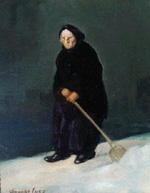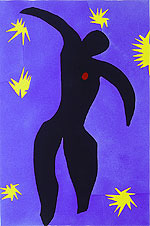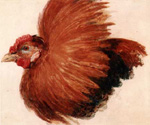|
from THAT WHICH IS SEEN: Dan Masterson
Tableau Vivant | Old Woman with a Broom Dan Masterson’s New and Selected (ALL THINGS, SEEN AND UNSEEN) was published in 1997 by The University of Arkansas Press. Two of his poems have won Pushcart prizes, and a number of poems have appeared in texts and anthologies. His work has appeared in many journals and magazines, including The New Yorker, Ontario Review, Sewanee, Shenandoah, The Georgia Review, Hotel Amerika, Poetry, The Paris Review, and Esquire. The founder and editor of Enskyment, an online poetry anthology of journal poems, he also directs the Poetry Master site for writers. He is in his 41st year at SUNY/Rockland.
(based on Vincent van Gogh’s The Potato Eaters, 1855, “I have tried to emphasize that those people, eating their potatoes She’ll be on her own soon enough, the girl With her back to us, the girl who seems safe On the sidewalk side of a store’s plate-glass Window, peering in at a family Frozen in place, sharing a bowl of bruised Potatoes left to rot from their day’s stoop Labor. But she is not. She is inside, On the wrong side of things. There is no glass, No store window, only the girl seated At the same table where she would have spent The rest of her life, if not for the hearth Fire that was left untended & soon turned The others to ashes swirling about The dooryard: fallow land to be sold off For taxes. She’ll save only the teapot As dowry to give Old Man Gunnora, Across the hedgerow, who will take her in To work the fields & share, too soon, a low Loft of straw to be left empty cold by An addled wife whose prattle creeps toothless Throughout the room. The gray knot of burlap She keeps wedged in the teapot’s spout gives off A flavor of hemp to each cup of tea She serves at night, after the girl is sent To town with a basket of vials, each one Slopped to the rim with home-brewed elixir: A cure made of spud juice to be peddled To households of door-slammers not given To believe that it will heal a blemish Or cankerous sore, ward off warts & boils, Dyspepsia, soothe frostbite & sunburn, Conjunctivitis, sore throats & toothaches, Warts, insomnia, sprains, ruptures & gout. After another night of no-sales, she’ll Make her way back, skipping along, singing The workers’ ditty she learned in the fields: “One potato, two potato, three Potato four....” until the cottage lights Slow her step & bring a wish to her lips: That Old Man Gunnora now be no more. (based on George Luks’s painting of the same name) “All country and small-town people have seen such old women, Her dead husband’s boots are too roomy, Even with bunched newspaper stuffed in The toes, but they keep her dry as they did Him when he’d walk his beat in the Irish First Ward, making sure all the shop doors Were closed & bolted against any hooligans Snooping about the alleys, as they always Do when a storm roars in off Lake Erie, Sending drifts curling up against the eaves Of their two-room house until it seems that There are no windows at all. He’s been gone Now since early fall, & the snow shovel isn’t In the cellar where it belongs; it’s as though They must have buried it with him, but she Knows that can’t be so. Her fingers, gnarled Around the broom handle, are starting to give Way to cramp. The snow is too wet to sweep, & the late sun has turned it all to slush, soon To crust. Her babushka & great-coat, even her Woolen pantaloons, are all growing thin to The chill, & the porch seems too many steps Away, as her eyelashes gather a frozen mist That stings as it clings. She recalls how he’d Clear the walk: great heaps of snow flying Away under the strokes of his muscled arms, His frosted breath rising like pipe smoke Pumped from his lungs with each heft of his Shovel now as absent as he is, as she tries to Sweep away the snow, & sees us staring at her As we drive ’cross town, warm & wrapped, Too curious on a pleasant Sunday afternoon. (based on Henri Matisse’s Jazz Icarus, 1947, “Back-street bars such as those located on West Genesee, Mohawk, His folks buy the lie: he’ll hit the books Over at his buddy’s house, & grab supper There, catch the Friday night double-feature At the Royale, stop off at the malt shop, & Be home around midnight. He slides his sticks Up his sleeve & heads off past manicured lawns, Alongside the library, & hops on the Delaware Bus heading south through the projects. Where Division cuts cross town, he transfers To the rush-hour local & rides it to the end Of the line, reading chunks of a crushed copy Of King Lear that travels in his back pocket, & Still has time to work his sticks through A few rudiments before the bus does its U-turn in the train yards. Just two blocks Beyond the freight house, he takes the alley They warned him about, & comes out on Perry, Smack in front of The Kitty Kat, its transom Sign rimmed with rust but still pulsing cool Blue neon through the eyes of a snarling cat. Inside, wishing he were black, he sees what He hoped to see: Big-Gate Clossen setting his Traps, his ride cymbal blazing in the klieg Light’s glare. The place is filling up, still An hour or more before the opening set of five, & the kid asks if he can drum for mike checks, & gets a Yes instead of the door! He rattles Off his own double-8: smooth triplets sliding Into a roll that blurs out atop the closed high Hat. The sound man wants it again, & BG stops To listen, & tells the kid to hang around, that He can sit-in for him on an early set or two. The kid nods, & slides his sticks into his belt, Somehow making it to a booth without his heart Banging through his chest. He orders a beer, but Settles for the coke they bring him in a mug. The trio starts early, whacking the room awake With Frenzy, & eases into Bird’s version of Easy To Love, BG’s shading so delicate, his brushes Must be tipped by strands of velvet, not wire. The kid figures if BG waves him up, he’ll go easy On the bass pedal, chatter some with both hands On snare & tom. Just like back home, behind the Closed French doors: Max Roach on the turntable, Perdido set at 78, & geared down to 33 for study, & back up to 45, before going flat-out at 78, Beat-for-beat with the master, ending with his Signature tinka-tink on the crash cymbal’s crest. The trio’s back from break, & BG’s calling to the Kid. He’s on his feet, hearing what seems to be Applause mixing with the pounding in his head, & Someone yelling for him to blow the roof off!
(informed by Barbara Morris’s Dance) “I would ask you to call and see me but I live in a medieval tower Three miles from Gort, below The falls on the Cloon River, A wind-toss of hardwoods pushed Off in the night, pokes high Enough to take the storm down To half of what it needs to be To turn the troop of jackdaws Inside out like so many crumpled Gloves hurled aground: the roosts They come back to waiting ahead In the sudden dark, their circadian Rhythm ending their late daystart Early, sending them home, off on Their hedge-hopping way, skimming The reed beds bent by this rain, Following known contours online, Astern to others whose thrust is Not quite frantic yet more than Concerned, safer from predators In such weather, but some will be Battered down to take bruising Shelter in a broken place, impaired Plumage drowning their slim chance Of reaching Thoor Ballylee, while The flyers gain the side parapet, Entering the common slats edging The staircase of flatstones, atilt At every turn: mounds of nesting Dung steaming anew in its tangle Of twigs, 12-brick high, as dozens Of wings fold in torn sleep, quiet As the toppled graves cluttering The sodden earthline beneath them. (based on JMW Turner’s Gamecock “Now, to put him in condition to fight, you only have to take out You want that one? Okay, but you can’t take Him home. Too young, six months. You can Have him for $300. Very good stock: a fine Butcher Mother, butcher son, inbred. Best I Keep an eye on him till this time next year. He’ll be all gaff-broke by then, & you’ll Need another five months more to get him Used to you. Don’t want to hurry a good one Like this. He’ll do you proud over there at Kellyville. Rush him on & you’ll be watchin Him drain out empty in some old tin pit in a Back-wash alley. You want better than that For him. We can mark him now for you: nose & toe punch, wing bands. Why, we can even Throw in a belly brand, if you like. Treat him Real good: feed him nothing but Chanticleer Slasher Feed & raw egg. Fresh-pulled liver & Fish pads mid-week. Then, close onto his first Battle, we’ll get him revved up on black coffee Laced with brandy. Makes him fast & brave & Reckless. You got a cock here who’s gonna be The champion. Little doubt of that. Gonna take You lots of comfort once you get him home. The more love you got to give him, the more Ferocious he’s gonna be for you in the ring. Treat him poorly, he ain’t gonna have no cause To live. Name? He surely does. At first sight, The wife called him Majestic. Fits him, don’t it! Mailing a Package to a GI in Iraq
(based on James Montgomery Flagg’s I Want You for the U.S. Army, 1917, “The Old Lie: ‘Sweet and fitting it is to die for one’s country.’” Just like the old days: brownies fresh From the oven, cooling in the milk chute At the side door. This morning’s paper Lining the empty shoebox. Three months’ Worth of Smithsonian magazines curled On the bottom, alongside our family’s Scribbled note staying away from being Far away: chit chat of neighbors & how His old team won a close one on Saturday, & how the VFW lodge donated fireworks To set the field ablaze afterwards, & The terrible noise they made, & about the New red, white, & blue uniforms the band Wore when it marched through the streets. But these days, there are no Uncle Sams On lamp posts, no rationing of gas or butter Or milk or eggs. No one saving milkweed Pod fluff for life preservers, no window Cards honoring those dying in a war we Continue to be told ended long ago, but see No end in sight, & must be careful if we ask What in the world we’re doing there anyway. The cookies are cool enough to pack, & We’ll use bubble-wrap beneath the lid. No Hemp string this time around. Clear tape Will bind it all like a well-wrapped wound. I’ll have some answering to do & forms to Complete at the post office, but that’s okay, What’s a war without an arsenal of brownies.
|





